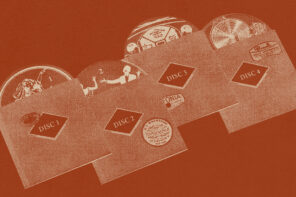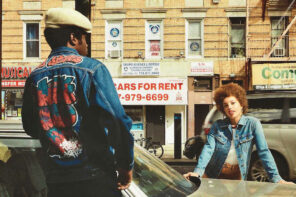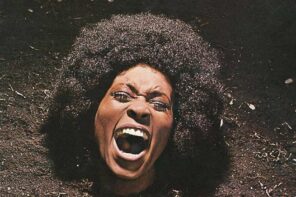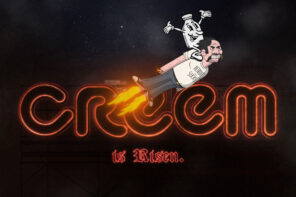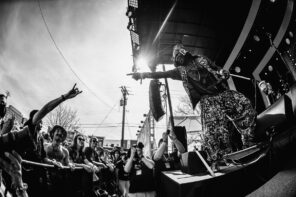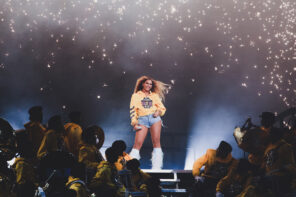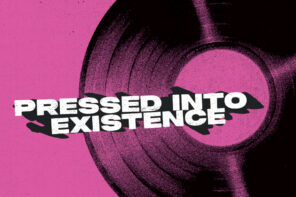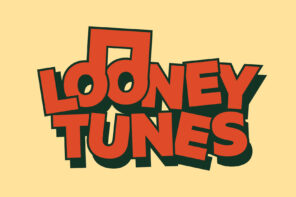The Jam in a Santa Cruz Backyard
Paradise Garage is a place, but, like maybe the name suggests, perhaps it is more a state of mind. The garage is an idea for a music community, session space, a recording studio and maybe a virtual live music venue. It’s also in Ryan Lee’s backyard in Santa Cruz, California.
Ryan Lee is a self-trained musician and recording engineer who had the idea to build a full-on recording studio in his backyard. And then he did it.
We first spoke with Ryan a while back, more toward the beginning of the you-know-what. He’d just about gotten to the end of posting all the videos of bands he’d recorded at Paradise Garage in the before-times, and, since he relied on touring bands passing through Santa Cruz to create new opportunities, the garage had been a lot quieter, which maybe his neighbors are thankful for (though we hear Ryan has done an aces job of soundproofing). But recently things have kicked back up over in Paradise, even if it’s been out of the Garage for the most part, and we should watch for some cool stuff coming over from @paradisegaragestudio.
We talked with Ryan about how he came to have a recording studio for rock bands next to his house, what his neighbors think and where it’s all going.
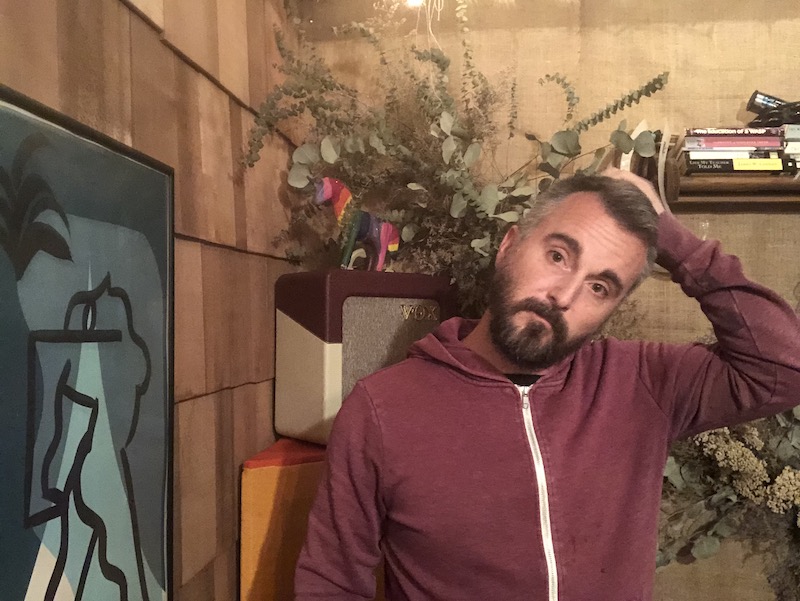
Ryan in Paradise
How did Paradise Garage go from being idea to become actual place?
Ryan: I initially started it to record albums just like a normal studio would. I moved to Santa Cruz about six years ago from Brooklyn. And about two years ago, my wife and I bought this house in Santa Cruz, and I took six months to build out the studio. It was just a really gross shed, with mouse poop everywhere, and dry rot.
So when you bought the house, you looked at the garage and you thought, “This could be a studio?”
Ryan: Yeah. Yeah, definitely. That was always a dream, just having a space that I could go full in on. It’s a really small room, but I thought making the acoustics as great as I could in there would be a really fun project. I read some books on building recording studios, and have a friend who does this handyman work. He helped out with the electrical and some stuff that required two people. Yeah, so I have two kids. My wife and I have a four year old and a one year old. I’m also a fundraiser for a healthcare network. And my wife and I are busy, just with the family and job and stuff. So I learned pretty quickly that recording albums for bands could easily be two full days, 8-, 10-hour days on just tracking drums. So it’s kind of too much of a time suck. Although I love to do it, wish I could do it more.
So you’re not busy or anything. What drove you to want to create that studio with all of that other stuff going on? Do you have a background in music?
Ryan: I just taught myself how to play guitar when I was 13, and I play guitar and bass in bands mostly, and sing in bands, too. Then when I moved to Santa Cruz I started drumming. So about six years ago when I started drumming I started recording the drums for the band I was in, and that kind of opened the door. Recording drums is the most challenging part of recording, a big acoustic instrument. The last six years have been just consuming myself with podcasts, and different educational websites, like Mix With The Masters, where there’s just a lot of great content to teach yourself.
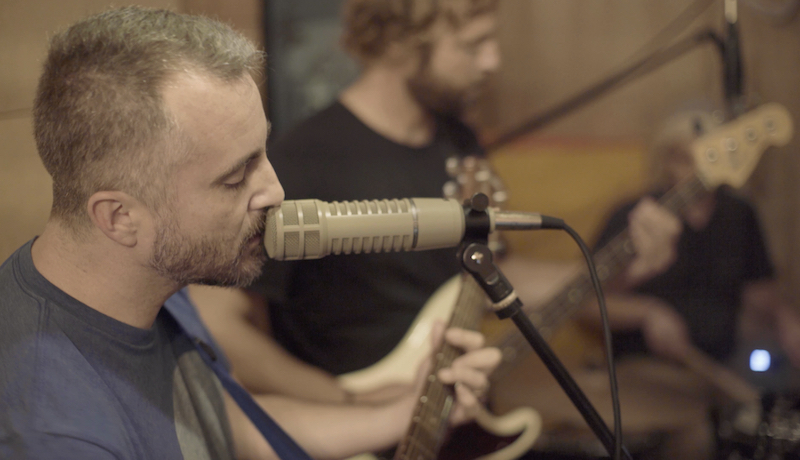
Ryan on the mic.
And the more I thought about it… I love Jam In The Van, Tiny Desk, KEXP, all these great video sessions. And I thought, “If bands would come in and just play a few songs, we could be done in 15, 20 minutes.” And that’s the way it’s worked out. Bands come in, we set up. It can take anywhere from two to four hours, depending on how much we’re just hanging around. But there’s a really cool venue down the street called The Crepe Place, and the last three bands I released, they actually came in and recorded just before they went to their show at The Crepe Place.
So we have a limited amount of time, because they had to get to their venue and to set up for sound check and everything. But it’s great. Set everything up in maybe an hour. I have a friend who’s a really talented videographer who handles the video side. I’ve done some of the video stuff, but my friend, Nick Johnston with Friendly Stranger Films has done the better ones.
How did you start the live music video series?
Ryan: The first video is this band BB Sinclair. They’re really great. But I definitely didn’t have the cameras or any of the experience. But I knew if I could just do one, it’ll start… something will happen. And then I did that one and I sent it to a couple of friends and met this guy who does film, Nick, and we’ve been partnering and it’s been a really great collaboration.
Nothing against the first couple, but it seems like after a couple they start to look really lush and cinematic.
Ryan: Yeah, definitely. And we’re still learning, I mean, I think it’s going to get better. We’re even figuring it out with each video and it’s like we’ll learn something a little new and yeah, we have an ideal camera set up in mind and some more lighting stuff we want to do. But yes, it’s great partnering with somebody on the video end because I really had no experience there and Nick is super talented.
You were in the process of launching the Paradise Garage series of video sessions when the things got shut down. You had a few in the can to release some good live music for a bit there though?
Ryan: Yeah, exactly. The MAITA video, we released April 10 but it was shot just at the end of February. And we’re all out. That’s the last one we got. I was actually spacing them out even more. I kind of wanted to be two or three months ahead originally with videos, just because I’m kind of busy, and thought it’d be nice to take a break if I needed to. But then I started releasing them more frequently, just to get them all out the door, and I figured I might as well.
The sound quality on all the videos is also really high.
Ryan: I do mix it and master it as if it were an album—I think I mix it as seriously as I would. I’m not just like, “Oh, it’s for video, that’s fine, that’s fine.” I’m like, “I want this to sound as good as possible and cool.” That’s another really fun thing about the project. Definitely mixing over the years I’ve developed my own style. But when you mix for a band’s album that just hires you like a normal mix engineer to mix their album, the end result isn’t always like what your style is because you’re doing whatever the artist wants. Of course trying to serve them the best they can. But with this it’s really fun. I do certainly honor and reference their albums so I know kind of what they like.
But I get to put my own flavor on the mix a bit more, and the bands are cool with it. But it’s going to be cool if at the end of the day I’ll be able to look back and say, all these cool bands, who I really wouldn’t have had the opportunity to record, mix and master an album for them. But I got the chance to record bands I like and put my own style of mixing on it.
A good example of one that you think really shows that—a good synthesis of your style and the band’s style?
Ryan: Yeah. I really love the way “Light in the Dark” came out, by The Blank Tapes. Just the guitars sounded so cool and there’s like a crazy, I don’t know, five minute guitar solo or maybe it’s not quite that long, like three minute guitar solo. But I thought that one came out really cool. And in general, I like a saturated, kind of warm, distorted sound. Even though I don’t mix on analog gear, I do still like that sound a lot.
AI am a fan of all the bands I’ve recorded and filmed so far. BB Sinclair’s singer has such a beautiful voice. And then MAITA too. And Bernie & The Wolf, just really, really good singers and it’s really fun to mix a good singer. And it’s funny too. As singers, they’re just so tough on themselves. But I think when you step back and listen to some of those takes, it’s really cool. And that’s another thing I like about it being live.
We’re not going to do 10 takes to put a comp together of the best possible take. Sometimes people hit bad notes. And as a musician, whenever I saw something like, John Lennon singing a song in an old video and he’s hitting a wrong note. It’s encouraging, I think as a musician.
What’s your goal with the Paradise Garage? What would you like to see it become?
Ryan: I think Santa Cruz is an amazing, supportive community, especially for music and the arts. Coming from New York where there’s a lot of things to go do and see. With all that going on, it’s kind of hard to get people to come out to shows sometimes. But at The Crepe Place, just down the street from my house…it’s like people pay 10, 12 bucks at the door not even knowing who’s playing. It’s just big enough of a town to get bigger acts on a weekday after their show in SF on a weekend, but then a small enough town that everyone is grateful when bands swing through.
It’d be really cool if it got bigger, then that would mean local bands that were on it would hopefully get bigger. And just more people would know about Santa Cruz and want to come through Santa Cruz and know it’s a supportive music community. So just like in general supporting the music scene.
My videographer and I, we talk about that too. We just want to have fun with it. We’re just having a lot of fun with it.
Right now people are becoming more and more accustomed to consuming their live entertainment and live music at home through their screens. So does that open up possibilities for what you’re doing with the Garage or larger ideas?
Ryan: Yeah, I think so. I think one of my main attractions to it was… I grew up in Suffolk, Virginia and it’s like, there’s nothing there. It’s really, really a small town. There’s not a music scene. Richmond’s two hours away. But growing up in a small town, wanting to play guitar and be in a rock band… for a lot of people that’s like their only access to all different types of music. A lot of people don’t have the luxury of going to a big city especially when you’re younger. When you’re older, then you can certainly make that choice. But just thinking of how formative the years are of learning guitar or your instrument then you end up being in a band. A lot of people coming from small towns. No matter where you are, you could watch our videos and be like, “okay, cool. That’s what the Santa Cruz music scene’s like.”


